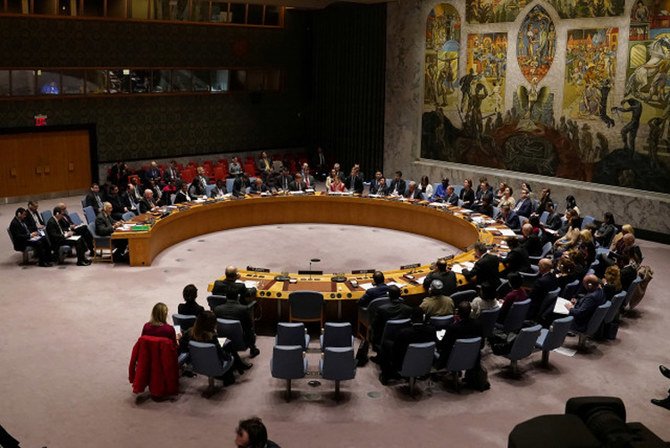NEW YORK: Members of the UN Security Council have unanimously agreed to extend the UN Support Mission in Libya until the end of the month, buying council members time to negotiate a longer-term solution to the presence of foreign forces in the country.
“The situation in Libya continues to constitute a threat to international peace and security,” they said.
The first Libyan presidential and parliamentary elections since a peace agreement was struck between the country’s warring factions last year are scheduled for Dec. 24, 2021.
In a UNSC meeting on Wednesday, both the US and Russia voiced support for those elections and expressed their will to see them carried out peacefully and fairly.
But the two powers have clashed in the past over how to handle the presence of foreign forces in Libya.
Russia has said any withdrawal of foreign forces must not upset the balance of power between Khalifa Haftar’s east-based forces and the Tripoli-based coalition of Islamist and ethnic militias.
In Wednesday’s meeting, the US expressed regret over the UNSC’s failure to reach a lasting agreement on the presence of foreign mercenaries in Libya, and reiterated the Biden administration’s support for the UN’s role in facilitating free and fair elections.
“UNSMIL has a vitally important role in helping Libya achieve peace and stability, including by supporting preparations for national elections and the implementation of the ceasefire,” said the US representative at the UNSC.
Similarly, the Russian representative said: “Our main aim now is to help the Libyan people to stick to the established timetable for the 24th of December parliamentary and presidential elections, and all of our efforts should be aimed to that end. We hope that this is the goal that is shared by all members of the Security Council.”
There has also been debate among council members over the structure of the UN presence in Libya, with the US pushing for a UN representative to be permanently based in Tripoli.
The UN’s head of mission is currently based in Geneva, but the US argues that since the country has achieved peace, he should be moved to Libya to facilitate greater engagement with actors on the ground.
Libya was plunged into years of civil war after long-time dictator Muammar Gaddafi was ousted by his people with the assistance of NATO jets.
Last year, Libya’s warring factions reached a fragile agreement to form a unity government, and the parties scheduled the first elections for the country’s post-war government in December.
But despite that progress, in a letter sent in August, UN Secretary-General Antonio Guterres warned of “growing stalemate on the political, security and economic” negotiations between factions.
Since Gaddafi’s ouster, Libyan militias have been central to almost all political processes, and they have repeatedly been accused of destabilizing the country and committing acts of violence against civilians.
This situation, Guterres warned, could deteriorate as elections draw closer. “The security landscape across the country continues to be characterized by militia networks leveraging their capacity for violence to secure senior positions in sociopolitical hierarchies,” he said.
“Violations of the arms embargo continue, along with armed mobilization, trends that are likely to continue given growing tensions around elections.”
Factions have formed a unity government and carried out elections in the past, but that government collapsed following disagreement over the role of Gaddafi-era officials and entities in post-Gaddafi Libya.

